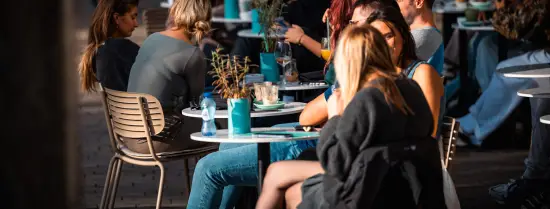
Entrepreneurs Cas de Weerd and Kasper Luiten both studied business administration at the Rotterdam School of Management, Erasmus University. There they not only developed a close friendship, but also laid the foundations for their business. They now supply their Cas & Kas bitterballen (a crunchy deep-fried Dutch snack) throughout the country. The bitterballen are vegan, but they would rather not share this up front. "We want to convince people on taste rather than on principle."
From business studies to bitterballen, what’s the story there?
Cas: "After our time at Erasmus University we went travelling in Latin America together. When we arrived back in Rotterdam, we both felt very strongly that we wanted to do things differently. Most people find a traineeship and start their corporate career that way: we wanted to be entrepreneurs. Initially we played around with the idea of importing Brazilian vegan snacks to the Netherlands, but after some brainstorming we realized this idea might be too niche. Then the concept of bitterballen came up."
Kasper: "Vegan snacks were a thing, but we noticed that non-vegans were not keen on them. That’s why we started 'project bitterbal'. That was the beginning of our mission to make a vegan bitterbal that is, above all, very tasty. An essential element of a great bitterbal is the ragout. We started experimenting in the kitchen of our student house on a Wednesday evening, watching YouTube videos for inspiration. We organised ‘bitterballen-drinks’ every Friday afternoon, where we let everyone taste our new creations and collected feedback. That helped us tremendously in finding the right flavour."
And what did you take with you from your studies at EUR?
Cas: "A lot! During our studies, we learned how to perform a market analysis and how tax laws work, for example, but HR and marketing also come into play. We don't have a culinary background, but the understanding of the business side we gained during our Business Administration study helps us on a daily basis."
Kasper: "We started small and scaled up while learning. We work according to the Lean Startup Method that you hear a lot about during your study. Many companies scale up quickly when they are not yet sure whether their product or service will catch on, but we really try to work according to a clear strategy."
How do you aim to create impact with Cas & Kas?
"By making the tastiest bitterbal that also happens to be vegan. We want to convince people on taste rather than on principle. Some vegans are quite activist and that can put people off. We want to make a product where no one feels left out. I think most people are trying to eat less meat, but they don't see themselves as vegan. You need a tasty alternative to meat to bring them on board."
Cas: "This is also exactly why we make it less and less explicit in our marketing that our bitterbal is vegan. Of course, the footprint of our bitterbal is lower than that of a traditional one, but we don't flaunt it. We prefer to focus on the surprise effect: we want people to really be surprised when they hear afterwards that they ate a vegan bitterbal."
What advice do you have for others who want to be impactful entrepreneurs?
"You really don't have to have a revolutionary idea. It's not like we found the holy grail with our bitterballen. And the earlier you start, the better. Without an expensive mortgage it is much easier to take risks."
Kasper: "Exactly. You need to spend time working on your idea for it to come to fruition. So that's my advice: connect with others and discuss your plans with everyone. That way you can finetune the idea and better understand your own concept. And by talking about it and testing your assumptions, you always discover new insights."
- More information
The lustrum year of EUR runs from the summer of 2023 to the end of the academic year in the summer of 2024. Various activities around the lustrum will take place in the near future. View all activities and more on the lustrum page.
- Related content
